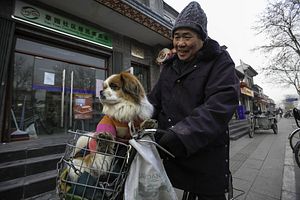Earlier this month, in part of a video campaign released by PETA, actor Joaquin Phoenix spoke out against China’s dog leather industry, calling it “one of the worst things” he’s ever seen. But what exactly is the situation of dogs in China?
Indeed, China is home to some of the most despicable treatment of canines and is arguably one of the world’s worst countries when it comes to animal abuse. Pets are stolen and skinned, their fur sold at home or abroad (e.g. Canada). Dogs and cats are boiled alive or beaten to death; live animals are used as keyrings; endangered species are ground into nostrums. Shelters, meanwhile, are mostly shams preying on naïve donors and Beijing is historically antagonistic to activists.
For dogs, the wellspring of suffering is the meat industry. Roughly 10,000 dogs are tortured to death annually at the Yulin Dog Meat Festival, where the tender flesh of puppies is prized. The gruesome images become provender for shelters looking to ‘save’ more victims and watch donations swell. Yulin isn’t the only such festival either.
What’s more, butchers don’t use captive bolt pistols to knock animals out before exsanguination — not because it’s prohibitively costly, but because consumers want the animals to suffer as much as possible, believing this enhances flavor. As one cook put it in the 2010 documentary San Hua, “the worse you treat them the better they taste.”
This is, of course, nonsense. Torture triggers fat-to-glucose conversion and lactic acid production, making the meat chewy and sour. That’s why deer hunters like to drop and dress their animals quickly by landing a single shot either to the brain or “boiler room” (i.e. heart-lung cavity). That’s also why humane slaughter methods are used in making some of the world’s best meats, whether Tajima beef from the foothills of Kobe, Japan, or acorn-fed Iberian ham.
Dog meat opponents are not out to denigrate Chinese culture. In fact, the very notion that this is Chinese culture is offensive. Though practiced in China, torturing animals is not a Chinese cultural trait, and such claims are not only insulting but ignorant of Chinese history, wherein dogs were long considered companions. For example, The New York Times reports Chinese emperors gave the Pekingese pride of place, executing any who stole them.
It wasn’t until the ideology and starvation induced by Mao that Chinese began to view nature as a mere resource to be plundered, which is precisely how wildlife was defined in the 1988 Wildlife Protection Law. Furthermore, “sympathy for the downtrodden” was considered a Western value and therefore “rebellious,” says political scholar and animal rights activist Dr. Peter Li of Humane Society International.
Thankfully, these attitudes are reversing. In 2011, Beijing activists paid $18,000 to rescue dogs from a delivery truck after a 15-hour standoff involving police. Last December 800 dogs, many still wearing the collars their owners had given them, were saved from a compound in Sichuan. There are also increasing reports of groups like Duo Duo Animal Welfare Project and Welfare For Animals (WFA), working to bring international standards (and awareness) to the problem. These projects, founded by Taiwan native Andrea Gung and Canadian Ruby Leslie, respectively, are beacons of hope.
Unfortunately, they are not yet representative of the whole; most shelters are without education, training, or resources. Capital Animal Welfare took 160 dogs in 2014 but disease prohibited the dogs from being adopted and, since euthanasia is taboo, most suffered to death. Moreover, CAW never fully paid the pharmacists or hospitals involved. Similarly, about half of the 850 dogs received by Yantai Headquarters for Stray Animals Aid died from distemper. As for the 2011 Beijing activists noted above, their group, China Small Animal Protection Association, was later sued by almost a dozen hospitals for not paying its bills.
Nevertheless, progress has been substantial. The 2011 Jinhua Hutou Dog Meat Festival was canceled following public outrage and last year’s Yulin Dog Meat Festival was held early to avoid protestors. Also, laws regarding animal testing for cosmetics have shown recent progress and in 2014 Beijing officials issued a new law updating the 1988 definition of the term “animal welfare.” The situation is appalling, but China is turning a corner in the way it treats animals and, with the help of groups like Duo Duo and WFA, it may even pick up a little speed.































